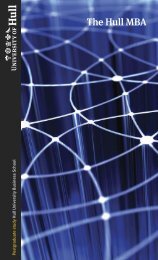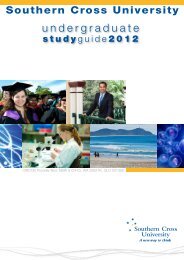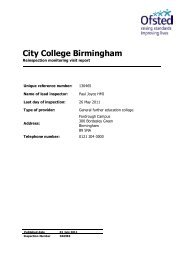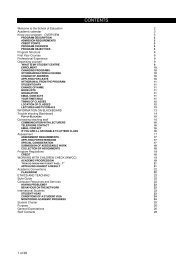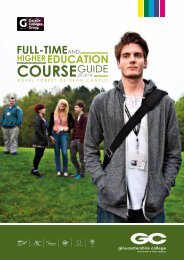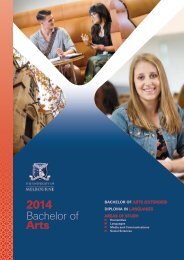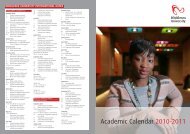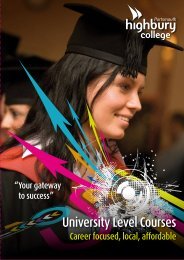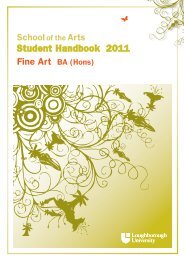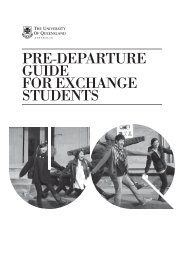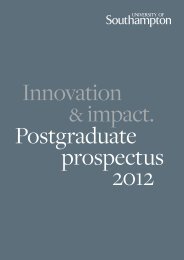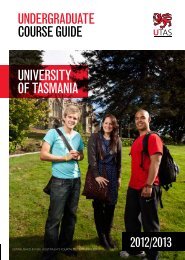Academic calendar Academic calendar - Study in the UK
Academic calendar Academic calendar - Study in the UK
Academic calendar Academic calendar - Study in the UK
Create successful ePaper yourself
Turn your PDF publications into a flip-book with our unique Google optimized e-Paper software.
Geography<br />
M<strong>in</strong>or: (6 courses)<br />
• GEO-121; 122; 214; 225;<br />
• Two of GEO-330, 368, 370<br />
Cognate Requirement:<br />
• ENV-101<br />
GEO-121 Introduction to Cultural Geography<br />
(F)<br />
An <strong>in</strong>troduction to <strong>the</strong> discipl<strong>in</strong>e which exam<strong>in</strong>es <strong>the</strong> development,<br />
viewpo<strong>in</strong>t, ma<strong>in</strong> <strong>the</strong>mes and research, concepts and techniques of <strong>the</strong><br />
field. The course attempts to answer <strong>the</strong> question: why are phenomena<br />
located where <strong>the</strong>y are, and how are <strong>the</strong>y <strong>in</strong>teract<strong>in</strong>g with those<br />
locations and each o<strong>the</strong>r<br />
GEO-122 Introduction to Physical Geography *<br />
The field of study is <strong>in</strong>troduced <strong>in</strong> a survey-type approach which<br />
<strong>in</strong>cludes <strong>the</strong> variety of geomorphic and climatological studies. Themes<br />
<strong>in</strong>clude chang<strong>in</strong>g <strong>the</strong>ories of <strong>the</strong> environment and explanations of<br />
recent research <strong>in</strong>to man’s relationship with this environment. (Please<br />
note: this course does not satisfy <strong>the</strong> social science core requirement).<br />
GEO-214 Urban Geography *<br />
Urban places have been alternatively called <strong>the</strong> crown of human<br />
<strong>in</strong>vention or <strong>the</strong> archetypal representation of human rebellion<br />
aga<strong>in</strong>st God. What are cities What challenges do <strong>the</strong>y extend today<br />
and for <strong>the</strong> future These are <strong>the</strong> key questions around which <strong>the</strong><br />
course is developed.<br />
Prerequisite: GEO-121 or permission of <strong>the</strong> <strong>in</strong>structor<br />
GEO-225 Canadian Geography<br />
(W)*<br />
The course focuses on regional patterns of settlement, economic<br />
development, <strong>the</strong> physical environment, and on <strong>the</strong> processes and <strong>the</strong><br />
results of regionalization. The central paradigms of community and<br />
responsibility are stressed.<br />
Prerequisite: GEO-121 or 122 or permission of <strong>the</strong> <strong>in</strong>structor<br />
GEO-330 World Geography<br />
(W)*<br />
This course provides an overview of <strong>the</strong> geography of <strong>the</strong> world. The<br />
course will break down <strong>the</strong> world <strong>in</strong>to regions (i.e. North America,<br />
Asia, Africa, Europe) and exam<strong>in</strong>e elements of physical, cultural,<br />
historical, economic, and political geography with<strong>in</strong> each region. The<br />
course will exam<strong>in</strong>e <strong>in</strong>ternational relationships with<strong>in</strong> regions and<br />
between regions, and how <strong>the</strong>se relationships affect, and are affected<br />
by, aspects of cultural, economic, and political geography. It also<br />
explores areas such as cultural comparisons of resource utilization,<br />
differences <strong>in</strong> levels of economic development, and environmental<br />
<strong>in</strong>fluences on cultural development.<br />
Prerequisite: GEO-121<br />
GEO-368 Population, Food and Susta<strong>in</strong>ability (ENV-368) *<br />
GEO-370-79 Special Topics (ENV-370)<br />
(F)*<br />
Health Sciences<br />
**Health Sciences is a new program effective 2012-13. The Honours<br />
Program <strong>in</strong> Health Sciences requires careful plann<strong>in</strong>g from Year 1.**<br />
Honours Major: (20 courses)<br />
• BIO-121; 122; 231; 336; 341; 342; 362; 441; 467;<br />
• ENV-101;<br />
• HSC-201; 242; 340; 490;<br />
• One of HSC-480, HSC-491, BIO-452 at Au Sable;<br />
• One of MAT-201 or 215;<br />
• PSY-227; 321; 458;<br />
• One of PED-223, SOC-432, BIO-452 at Au Sable*<br />
*BIO-452 may not be used <strong>in</strong> both categories.<br />
Cognate Requirements:<br />
• CHE-121; 122; MAT-121; PED-118; PHY-115 or 121; PSY-122; HIS-313;<br />
PHL-314<br />
Note: All students registered <strong>in</strong> <strong>the</strong> Health Sciences B.Sc. program are strongly<br />
recommended to choose a m<strong>in</strong>or from <strong>the</strong> follow<strong>in</strong>g:<br />
• Bus<strong>in</strong>ess<br />
• Chemistry<br />
• Environmental Studies<br />
• Math<br />
• Physical Education<br />
• Physics<br />
• Psychology<br />
• Sociology<br />
• Social Work<br />
• Sociology-Social Work<br />
HSC-201 Pr<strong>in</strong>ciples of Epidemiology<br />
(W)*<br />
Epidemiology is <strong>the</strong> study of disease <strong>in</strong> human populations that strives<br />
to improve <strong>the</strong> health of persons with<strong>in</strong> those populations. Students<br />
will learn about <strong>the</strong> nature and uses of epidemiology, about health<br />
outcomes, and about <strong>the</strong> breadth of study designs used to address<br />
various health problems. They will explore causes of diseases and<br />
<strong>the</strong>ir associations with various factors that determ<strong>in</strong>e <strong>the</strong>ir effect on<br />
health outcomes. Students will also learn about diagnostic test<strong>in</strong>g and<br />
<strong>the</strong>rapeutic studies that comprise much of cl<strong>in</strong>ical epidemiology and<br />
on which much of medical management is based. Ethical issues <strong>in</strong><br />
epidemiology will also be discussed with<strong>in</strong> certa<strong>in</strong> topics and students<br />
will develop skills to critically appraise health sciences literature.<br />
Prerequisite: MAT-201 or 215<br />
HSC-242 Inquiry of Issues <strong>in</strong> Health<br />
(F)*<br />
This course will explore two health-related issues to develop skills<br />
necessary to perform effectively as a health researcher. This course is<br />
problem-based; it is skill-driven ra<strong>the</strong>r than content-driven and focuses<br />
on <strong>the</strong> development of skills that are widely sought <strong>in</strong> university<br />
graduates - <strong>the</strong> ability to research and analyze detailed problems and<br />
to communicate clearly and persuasively. This course will <strong>in</strong>volve<br />
<strong>in</strong>terdependent and <strong>in</strong>dependent small group learn<strong>in</strong>g. Collectively,<br />
<strong>the</strong> class will ask questions that will explore <strong>the</strong> topics from multiple<br />
perspectives: physical, psychological (emotional, social, and<br />
cognitive), and spiritual. Students will consider relationships between<br />
<strong>the</strong> evidence of <strong>the</strong> complexity of human health and weaknesses and<br />
<strong>the</strong> <strong>in</strong>terrelated nature of <strong>the</strong> restoration of human wellness. The class<br />
will also consider various k<strong>in</strong>ds of reductionisms <strong>in</strong> health.<br />
90



